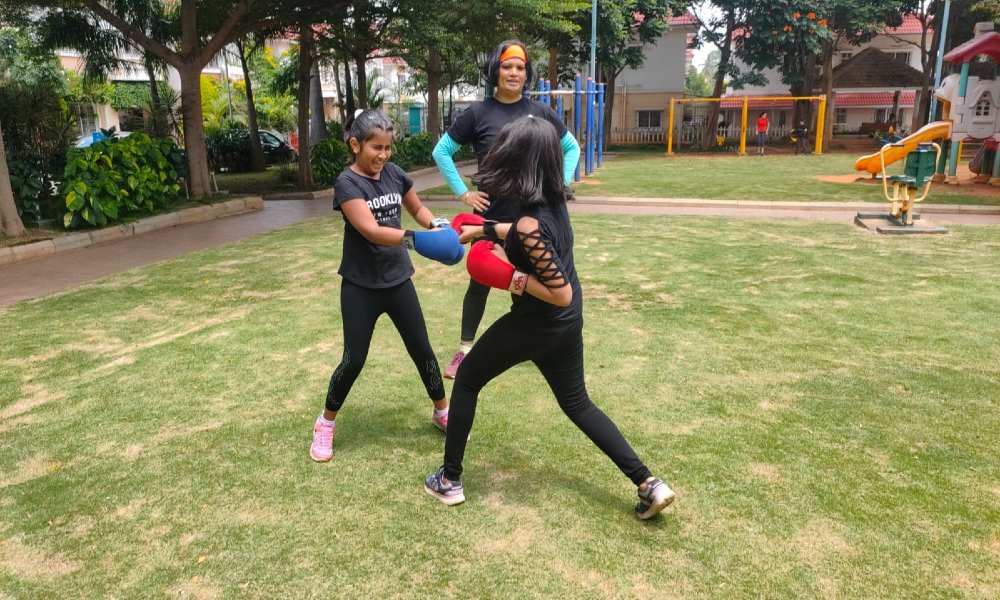Self-defence classes could be beneficial in real situations, say trainers however others doubt their impact.
Despite University Grants Commission’s (UGC) recommendation to give self-defence training to women studying and working on campus, many colleges and universities do not organize such sessions while some have stopped mid-way.
Most college students have never been trained. They wish for colleges to look into recommendations for their safety. Ankitha, a college student in Bangalore said that self-defense training should be for all, just not women. “Schools and colleges are the places where we spent most of our time learning, hence, these activities should take place there,”Ankitha added.
“If colleges organize such classes, it would make me feel more confident. I would know how to act or think in situations where my safety is compromised and I would have control of my safety,” said Ankitha.
Self-defence training could be helpful in thinking correctly at the moments when someone is at risk. Ankitha narrated an incident where one of her juniors was walking up to a bus stop at 5:30 a.m. to reach college early for an event. “Somebody grabbed her from behind. She saw him walk past her but she did nothing. She froze at that moment. She did not know what to do. Maybe if we were in her place, we would have reacted the same way,” she said. It would have been tough to comprehend what happened, Ankitha further said.
“That is why self-defence classes are important. We need to know how to act immediately. We should be prepared and aware of how to react,” said Ankitha.
The UGC notification regarding the safety of students mentions that this training should be organized in coordination with training institutions or Non-Governmental Organizations (NGOs). It should be a mandatory component of extra-curricular activities. The training can follow instructions on rape-aggression-defense model (Hyperlink about this?). This model focuses on strategies like awareness, risk reduction and risk avoidance and hands-on self-defence techniques.
The pandemic affected the regular co-curricular activities and not all colleges have been able to get back on track with them. Nalini Srinagesh Paul, an assistant professor at a government college in Bangalore said that in her college, no self-defense classes are taking place. “After the pandemic, there have just been classes and exams, no activities. The management says that they do not have funds for it. They have not been doing anything in this regard. Self-defence classes are also not taking place,” Paul added.
She further said that such activities would make the students more active, alert and confident. But it is for the university to think of starting these activities for the good and just not focus on academics and exams.
Self-defence classes are appreciated for instances where people have been able to put the skills at use for real. However, others question the impact of such classes. Astha Agarwal, a self-defense trainer at a self-defense academy in Bangalore said that her students have used the techniques learnt in classes to handle adverse situations bravely. She shared instances where her students took a stand for themselves and used self-defense techniques. “A pre-university college student faced a situation in a gym where her trainer harassed her. She tackled him through self-defense. The trainer resigned from his job,” Agrawal added.
One of her students tackled a situation with her boss through the techniques she learnt at the academy. “She is still working in the same company and the boss took a transfer,” Agrawal said.
However, Meenakshi Giridhar, who has previously worked with Durga, an NGO working for women safety said that self-defence classes cannot be the solution to situations compromising one’s safety. “These courses are a great module for physical exercise and to help people stay fit. I do not see how it will in safeguarding oneself in situations wherein someone is grabbing you, abusing you or harassing you in some way,” said Giridhar.
Instead, student bodies could have conversations with college authorities to set up mechanisms to address issues and complaints for the safety of both boys and girls, she added. “But again, in today’s time we see colleges policing children instead of creating space for free and safe expression,” Giridhar added.
“Self-defence training is not the solutions to problems that are very systemic. Since the issue arises from a systemic set up of gender-based violence, the solution should come through the community,” she added. Hence, holding conversations about the issues in the society and bringing in more boys to that conversation, would help in understanding as to what one can do to bring down violence against women or other genders, Giridhar said.
“Firstly, we should make it compulsory. Students specific to National Cadet Corps (NCC) go through physical training while others do not have physical activities as a part of their activities. Hence, colleges can come together with self-defence academies to have these courses in place,” said Nyamat Bindra, a gender rights activist.
“Self-defence trainings could make one more aware and alert. It can bring in confidence and mindfulness, which makes one more conscious of their surroundings. Hence, it can help people in developing better reflexes in these situations to act for themselves,” Bindra added.
Time and again the need of self-defence training has been talked about in reports where at times students have taken initiatives. Moreover, petitions to mandate self-training for students across schools and colleges in India have circulated earlier.




